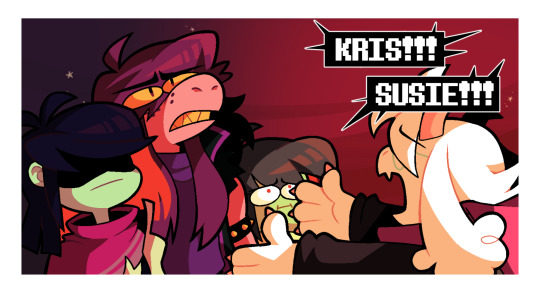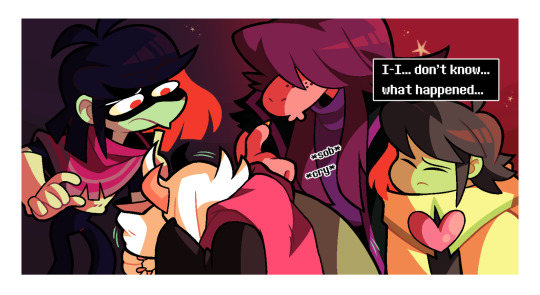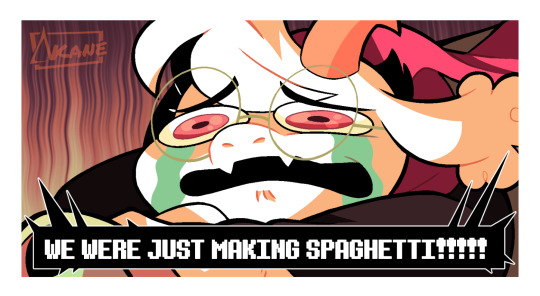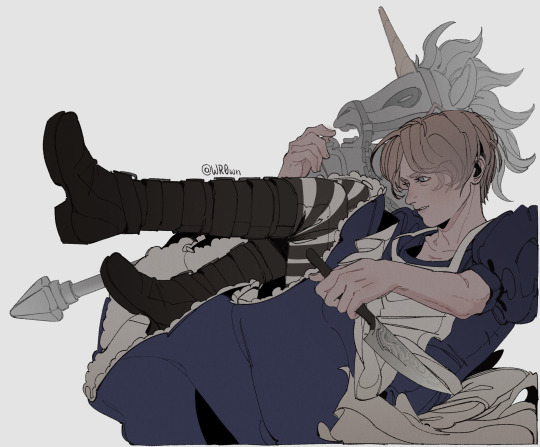#MAGIC MADNESS
Explore tagged Tumblr posts
Note
Not my hound crying and still asking to be killed before the madness fully takes
The very worse thing is that, as you can see in Adrei's snippet, one isn't aware of their madness, even as it fully takes hold (like in many mental illnesses). They just think everyone is against them, and won't stop until they do what their madness tells them to.
It is only afterwards that they become aware of how they were not lucid at all.
That would make stopping a mad battle mage all the more harder. And would make MC, or whoever affected, have a hard crash afterwards when the madness slowly recedes.
76 notes
·
View notes
Text

UK 1987
11 notes
·
View notes
Text
As much as i love Dungeon Meshi, i do think that given Ryoko Kui's attention to realistic worldbuilding there ought to be a companion series called Dishes Meshi where they spend 2hrs washing and drying and packing away. Alll the goddamnfuck dishes they just made
#EVERY TIME i make something even slightly fancy for dinner im like#HOW ARE YOU WASHING ALL THOSE DISHES IN A DUNGEON ?? DO Y'ALL REALLY ONLY USE 1 BIG PAN?? HOW?#where is Chilchuck being like 'jfc Laios‚ you couldn't have let this bowl soak while we made the gyoza?? now it's all dried on...'#where is Marcille going 'Ok gang. We need to stop somewhere soon to wash each of our 2 outfits. and our 173 dishtowels'#On second thought maybe Marcille just does it all with magic which makes me mad fucking jealous#if this is already covered somewhere in the Adventurer's Handbook or the later manga chapters I'll feel real dumb but Ah Well#dungeon meshi#i am attacked by hundreds of crows
4K notes
·
View notes
Text
Oh my god.. this post was cooking i had to..



#dungeon meshi#delicious in dungeon#dunmeshi#thistle dungeon meshi#art#izutsumi#chilchuck wasnt actually mad he just wanted sleep LOL#OH YM GOOOD THISTLE IS PERFECT FOR IZUTSUMI#maybe he has the occasional weird dreams bc of thistles magic but mb his desires being eaten made it tamer.#whats with thistle and his attraction human monster hybrids (falin and izutsumi)#i think he sees her as just some random fuckass cat#the same way how thistle was not bothered by the dragon looking like a woman now. its not his business#“whats this cat doing here? erm... anyways”#thistle the perfect size too... and the beds big and he doesn't move nearly as much... heh#ik izutsumi and yaad are buddies... but i think izutsumi is still confused tk how his doll friend turned into some old man
3K notes
·
View notes
Note
A guy who just wake up from a coma -> what did i miss?
Pomefiore was the last plot i follow before real life made me forget about our silly boys. How bad has the plot become now for our gang? Also who is that Gojo looking guy?
anon, I am so sorry and I mean this in the best way, but I do think episode 5 is the absolute funniest place to have stopped following Twst because shit starts escalating SO fast after that. episode 6 literally starts with a secret government shadow agency breaking down our doors and kidnapping students. zero to a million instantly.


and like...that's not even the zaniest thing so far? Ortho's hacked into the collective human unconscious. there's time travel (sort of). "Crowley might be Malleus' long-lost father" is a serious theory. if you'd told me any of this back pre-episode 6, I would have asked for the link to this unbelievable but highly intriguing fanfic.
also, episode 7 gave us (and then immediately took away 😔) the best character in the whole story:

#art#twisted wonderland#twisted wonderland spoilers#twisted wonderland episode 7 spoilers#twisted wonderland book 7 spoilers#there are better and very comprehensive summaries out there so i'm not gonna get into it with any seriousness#(genuinely a LOT has happened)#but let's recap very quickly#episodes 1-5: our friends' RA is a huge asshole! jack's sports idol is trying to cheat at the big game! who will win the talent show!#i sure hope no one turns into a monster and tries to kill us!#episode 6: a shadowy government organization has stolen our friends (and cat) to experiment on#idia throws himself into hell and then tries to destroy the world. we punch ortho so hard he grows a soul.#episode 7: malleus has an existential crisis and traps everyone in an eternal dreamworld#extended diasomnia backstory flashbacks reveal that silver is a cursed prince and lilia wanted to be the filling in a royal sandwich#somehow sebek is the most normal character and that's the real twist right there#every new chapter is its own wild fever dream and i'm so here for it#as for this gojo fellow#i had to google him because i am unfamiliar. but i believe you are referring to our dear friend scully (skully?) j graves#from that time we got sucked into a magic book (again) and then he got mad at us for being fake halloween fans#also he wouldn't stop kissing our hand. who says there's no smooches in twst.
3K notes
·
View notes
Text

why dis 🐐 look so mad 😭😭😭
#dimension 20#d20#dropout#dropout tv#misfits and magic#evan kelmp#whitney jammer#art#fanart#digital art#artists on tumblr#digital illustration#illustrators on tumblr#mismag#misfits and magic season 2#misfits and magic 2#mismag 2#meme#meme redraw#why dis look so mad meme#my art#dreamingeyes
1K notes
·
View notes
Text

#mlp#mlp:fim#mlp friendship is magic#comic book cover art#library of madness#spooky#illustration#graphic design
708 notes
·
View notes
Text
I think we as the LU fandom need to stop the whole "Sky gets mad at Wild for the Master Sword breaking in TOTK" and start going "Sky is going to throw hands with TOTK Ganondorf no matter what laws of magic he has to break to do so".
Bc let's be real here, if Sky ever found out that Ganondorf tried to kill Wild and literally destroyed Fi while attempting to do so bc she was protecting Wild the best she could, he really would just go and kill Ganondorf himself.
He would manifest himself into Tears of the Kingdom in any way he possibly could (as a ghost, via possession, literally forming a physical body out of pure spite and rage, fistfighting the Shadow to open a portal) and he would jump into the Hyrule Castle rift and murder Ganondorf single-handedly.
And Wild would 100% be on board with this bc 1. now he has the best back-up he could possibly ask for; and 2. he knows that Sky murdering Ganondorf would be glorious to watch
#linked universe#lu wild#lu Sky#I'm very serious about this guys#if you think Sky would yell or get mad at Wild for surviving a direct attempt on his life#even if Fi needed who knows how long absorbing Zelda's magic to recover#instead of being angry at the person who literally Tries to Kill Wild on Multiple Occasions#I'm extremely concerned about you#totk#I guess#you know what imma try writing a fic about this hold up#god shattering star sky
827 notes
·
View notes
Text
Conversations between best friends has often led to some reckless/stupid/not thought out at all decisions. Like one conversation the amity park trio had where Danny said that he couldn't see Tucker as a doctor (the medical kind) to which Tucker responded with "Alright, bet." and enrolled in medical school. ----------------------------------------------------------------- Bruce Wayne and Tucker Foley somehow by coincidence *cough* clockwork* became friends. And stayed friends even after Bruce dropped out and Tucker went on to finish med school. It was a strange friendship that was mainly just Bruce calling Tucker from the weirdest locations and asking things "Out of curiosity, if an immortal nutjob wanted you to marry his daughter and become his heir what would you do? uh-huh, uh-huh, really? ok, thanks." and meeting up for coffee every now and then. It was during one of these coffee meet-ups that Bruce confessed that he wanted to adopt a recently orphaned child by the name of Richard. There was currently push back from people who didn't think 'Brucie Wayne' would be a good parent and from others who didn't want a random kid having a chance to inherit the Wayne fortune, the media was also having a field day. Everyone kept asking him to "reconsider" and doing everything they can to stall/stop the adoption process. Tucker, being the good friend he was, said "Don't worry, I got this" Stood up from the cafe table, walked to the nearest library and politely asked to use one of their computers, spent a good ten minutes on it, printed something out on the library's printer, walked back to the cafe where he left Bruce waiting. And finally, he handed over the paper with the words "Take this." and continued drinking his now cold coffee. Bruce was, understandably, confused. "What is-" "Trust me, it'll work." Tucker assured him. That is how Bruce Wayne adopted one Richard 'Dick' Grayson.
And after that, Bruce went to Tucker whenever he came across a kid that he wanted to adopt, which was often. It's one reason why Tucker will do everything in his power to make sure Danny and Bruce never meet for fear that the Gothamite might try to add the Halfa to the growing army of children. Aka
Tucker Foley is The Guy
#dpxdc#dcxdp#dp x dc#dc x dp#danny phantom#danny fenton#batman#becoming a doctor out of spite#Tucker has a medical degree that's collecting dust while he tinkers with tech magic#He has a license and is legally allowed to practice medicine#He never does#Bruce is keeping an one on him because everyone knows all doctors go villain in gotham#Bruce: please don't become a mad scientist#Tucker with a basement filled with very dangerous tech: ...Have you met me?#I was thinking about Sam being the one going to med school#but she'd hate Brucie wayne#Bruce sometimes forgets to come at things from a normal POV so he go's to Tucker for advice#Tucker gives bad advice#Another late-night ramble
3K notes
·
View notes
Text




The joy of cooking
All credit to the idea of another cooking session ending with Castle Town in flames goes to @lupucs
FIRST - PREVIOUS - NEXT
MASTERPOST (for the full series / FAQ / reference sheets)
#deltarune#deltarune fanart#undertale#undertale fanart#deltarune comic#comic#utdr#crossover#twin runes#twin runes comic#my art#kris dreemurr#ralsei#susie deltarune#frisk#he's a sensitive boy#and not aware that the magic cauldron isn't spaghetti compatible#at least when undyne makes it#also is that mad mew mew?#yes#yes it is#where else was she gonna go when the dog shrine got replaced by castle town
7K notes
·
View notes
Text
The JL witnessed Captain Marvel scolding a magic user for some dumb and dangerous shit they did
And if they weren't sure that their friend was a dad before they sure as hell are now
As they watched they started to feel guilty themselves even tho haven't done anything. They felt like watching their sibling get their ass beat
#billy batson#dc#dcu#shazam#dc captain marvel#justice league#he's hitting the dad stance and all#he doesn't realise what power he holds#he's not mad just dissapointed#which is objectively worse#the magic user bolts away as soon as Billy dismisses him#this was taken straight from the discord server
545 notes
·
View notes
Note
Question if/when the MC goes mad to the point of no return, which of the ROs would be capable of putting him down for good if it came to that?
Probably just the RO they are closest to, romantically or platonically, because that bond would make a mad battle mage at least falter or stop. But then, Gwyar and Morien wouldn't have the physical capability, as for the others, who would even be willing to do it?
The answer is Yniol. Probably Yniol. They would hesitate less, and hit exactly to give a clean, quick death.
76 notes
·
View notes
Text

Is it mad to pray for better hallucinations?
#leon kennedy#leon s kennedy#leon scott kennedy#leon kennedy fanart#re2 leon#re4 leon#leon resident evil#resident evil 2#resident evil 4#resident evil#re4#alice madness returns#art#digital illustration#illustration#fanart#artists on tumblr#my boy#my magical girl#a little mentally ill#my babygirl
2K notes
·
View notes
Text
im sorry shadowfax is just a NORMAL FUCKING HORSE?????
listen you try being a 12 year old watching the two towers directed by peter jackson for the first time and watching gandalf--who I will remind everyone is a literal magic wizard with magic wizard powers and shit--summon a white unicorn-looking horse out of seemingly fucking nowhere and declare that horse to be lord of all horses. You try that and don't fucking assume that's a magic horse. shadowfax, 'lord of horses' and i took that LITERALLY i thought he was a sentient king of horses with authority in horse society
nah bro, he's just a horse gandalf STOLE from theoden
#im reading the lord of the rings if you couldn't tell#lotr#lord of the rings#the two towers#shadowfax#i don't know why I'm so mad about this#i just feel like assuming its a magic horse is a logical assumption given the context#BUT NO#just a fucking regular normal fucking horse
2K notes
·
View notes
Text



The Company but they're dressed up for Halloween
pt 1 / pt 2
#the hobbit#lotr#hobbit#bilbo baggins#frodo baggins#ori#nori#dori#oin#gloin#heartselect#my art#halloween#the ris ended up so cute cries i love them look at them#i wanted gloin ina cowboy outfit so oin is stuck in a buzzlight year outfit instead of a horse costume#baby frodooooo i was gonna turn him into a fairy but ehh#ive been reading thru magical hobbits tag on ao3 v fun#dori just knew mad hatter had tea parties and ran with the costume#i just think gloin in a cowboy outfit#he has a snake in his boot#thorins company#bilbo#frodo
488 notes
·
View notes
Text

Help what did i just make💀😭
#mashle#mashle memes#i hope no one has done this yet#pls ignore the shoes😭#mashleverse#mashle fanart#mashle magic and muscles#rayne ames#finn ames#マッシュル#why dis look so mad meme
855 notes
·
View notes